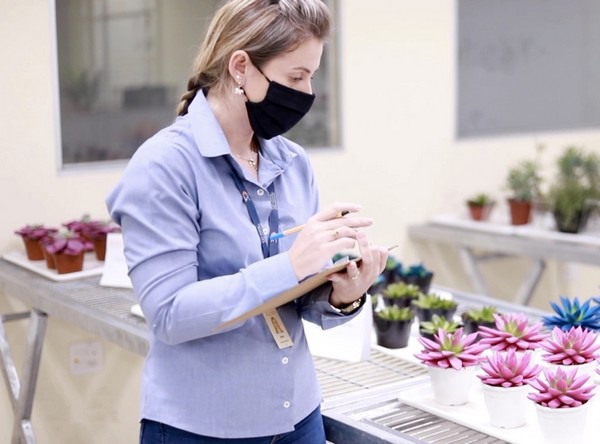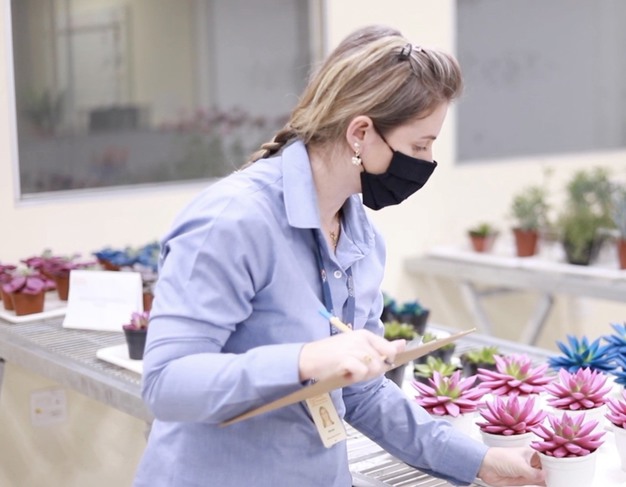The "flower makeup" technology emerged in the Netherlands in 2012 and conquered the Brazilian market in 2020, in the midst of a pandemic. The demand has been growing steadily, following global trends in the consumption of ornamental plants, but consumers still seem to feel uncomfortable with the use of artificial dyes. Recent research revealed that the colorization of plants is harmless for both people and plants.
"The "flower makeup" technology has brought colorful, cheerful, playful, and festive products to the Brazilian market supplying and pleasing a growing demand, and we are therefore very pleased with the result of this research," says professor and researcher Antonio Hélio Junqueira, consultant at Cooperative Veiling Holambra, who carried out the research together with fellow researcher Marcia Peetz, from Hórtica Consulting Trends and Market Intelligence.

People felt uncomfortable with colorization
He explains that this artificial colorization of flowers and plants is made with non-toxic, water-based, and biodegradable paints so that it does not cause damage to customers, workers, the environment, and, of course, the plants themselves. Even so, there was still some apprehension on the part of consumers regarding the use of "makeup" on flowers and plants. "We carried out a survey on the main social networks and online discussion forums among consumers, and we realized that they still felt very uncomfortable with the colorizations," says professor and researcher Antonio Hélio Junqueira, consultant at Cooperative Veiling Holambra, together with fellow researcher Marcia Peetz, from Hórtica Consulting Trends and Market Intelligence.
Scientific laboratory study
Therefore, to reinforce its commitment to the quality of the products offered and to environmental responsibility, Cooperative Veiling Holambra initiated a detailed scientific laboratory study on the development of plants after the use of artificial dyes in its Test Center.
Interventions were harmless to the plants
After keeping the plants under analysis for 90 days, under controlled lighting, temperature, relative humidity, and light conditions, it was proved that the interventions were harmless to the plants. "The plants remained healthy and intact after being colored, gradually returning to express all their original characteristics," adds Dr. Helio Junqueira. Plant samples originating from three different types of coloring processes and products had the same evolution in growth, durability, and maintenance of commercial quality when purchased with plants that did not receive any type of treatment.

Positive development for flowers and ornamental plants in Brazil
The result of this research was published in the International Journal of Advanced Engineering Research and Science, a publication with a great international scientific reputation among the global community of researchers, students, business people, and those interested in science in general. "For us, this publication is like a trophy. Having an unprecedented work like this approved by an international scientific journal is very gratifying", celebrates Bruna Chimin, laboratory analyst at the cooperative Test Center, who conducted the analyzes in the sector in partnership with Elaine Pierre. Dr. Hélio Junqueira said that research like this one contributes to the safe and attractive offer of new products based on trends in the flower and plant segment. "This collaboration between academia and the market favors the development of the productive chain of flowers and ornamental plants in Brazil," he concludes.
Great opportunity for the Brazilian market
The project took place under the coordination of the Cooperative CEO Jorge Possato and the Marketing and Product Manager Thamara D'Angieri. "When the Cooperative invests in technical trips, we usually seek to bring what is a trend abroad and a great opportunity to the Brazilian market, the colors that are harmless to flowers and plants have everything to do with the happiness of our people and they can be used to decorate parties and many other options, and the flowers get back to their normal color in a new bloom," emphasizes Thamara D'Angieri.
Click here to read the full study.
For more information:
PhD Prof. Antonio Hélio Junqueira
Hortica
Email: [email protected]
hortica.com.br/
